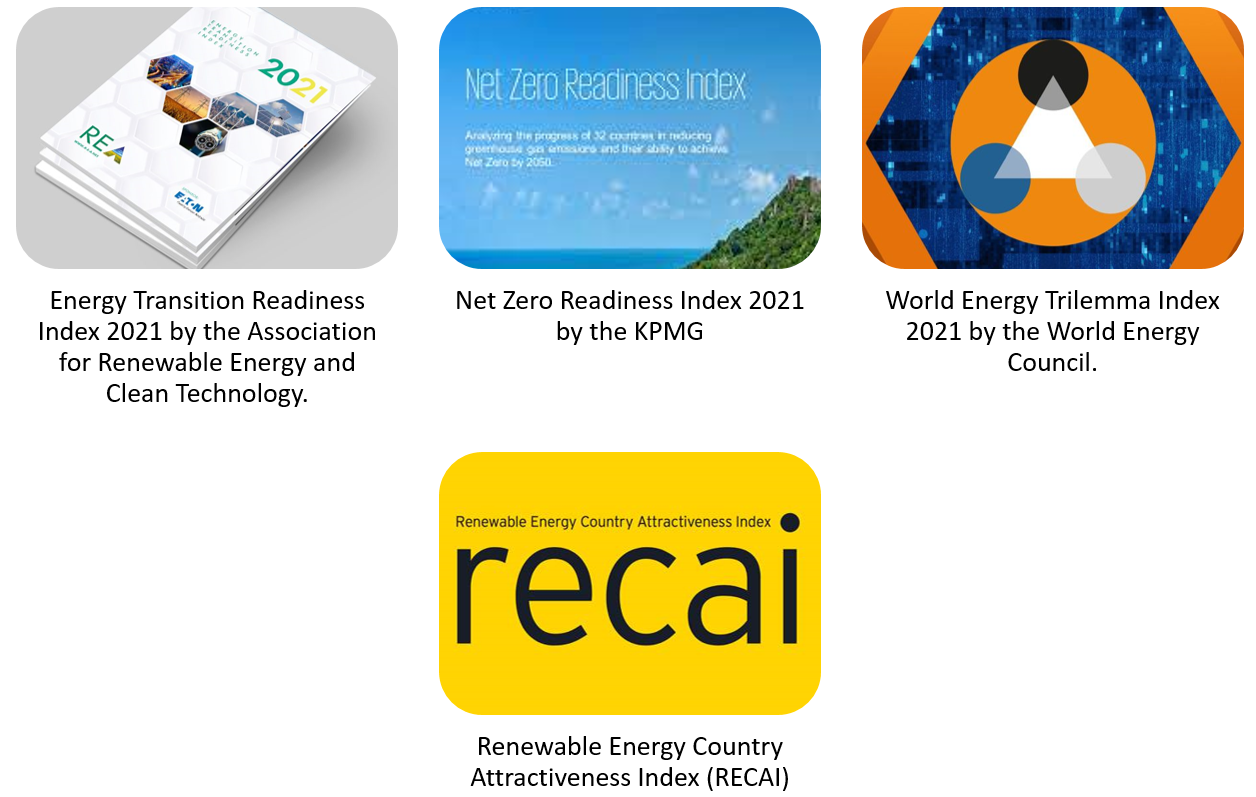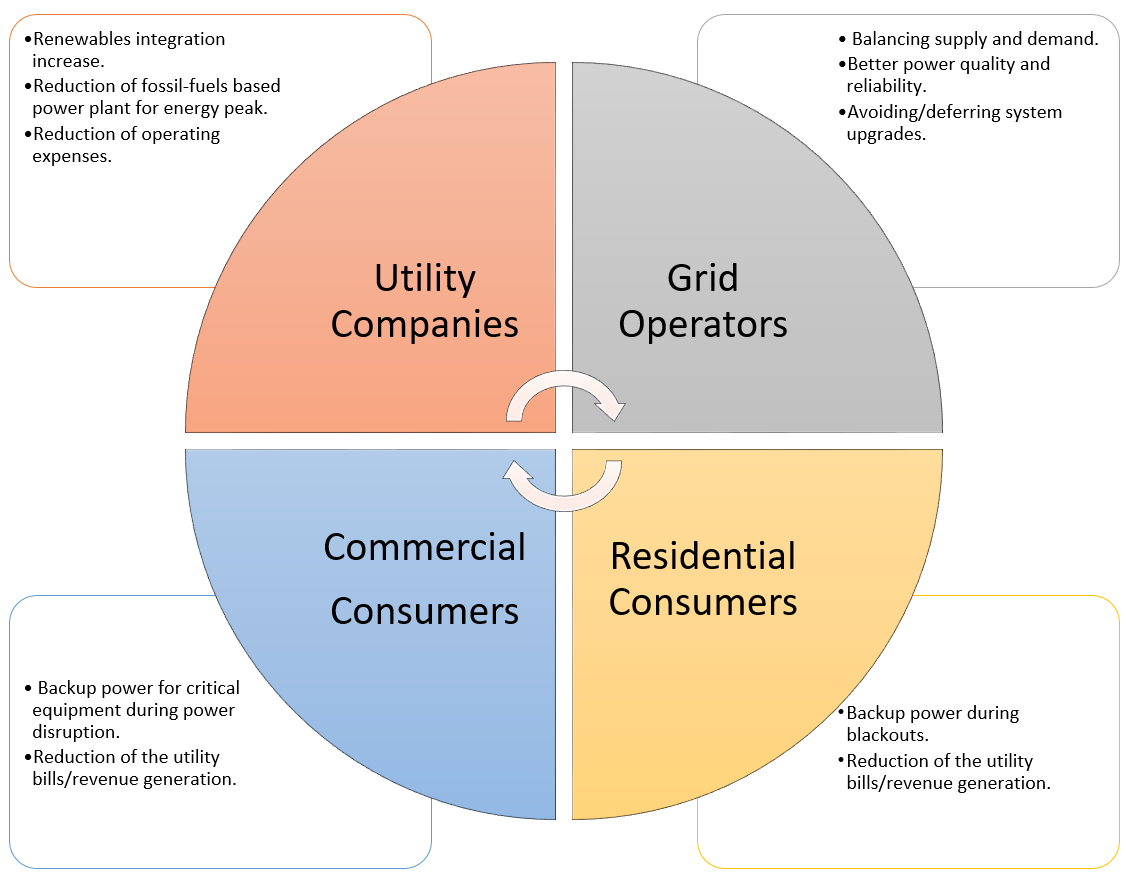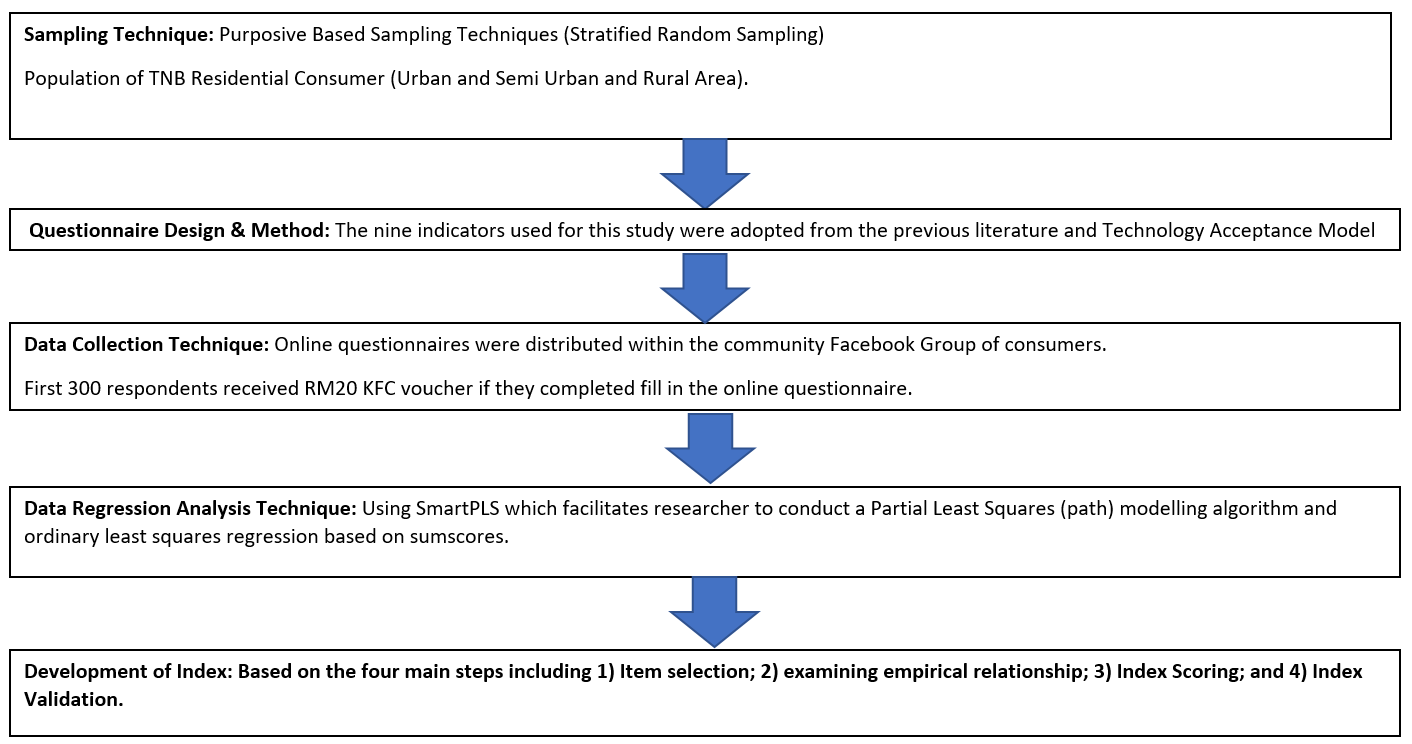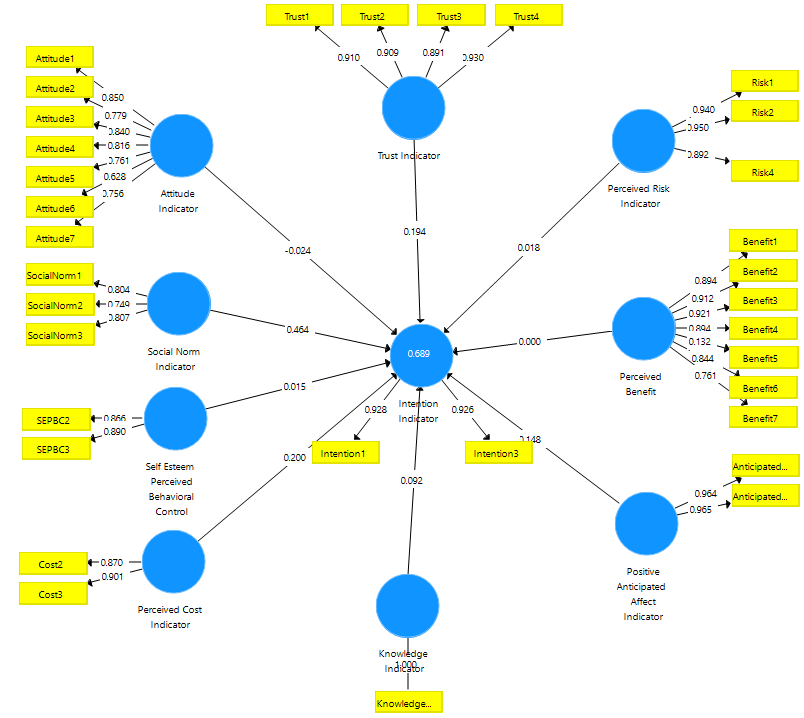Abstract
For developing nations like Malaysia, consumer acceptability of net-zero carbon emission technology, such as large-scale energy storage systems using batteries, is crucial. By determining consumer acceptance of large-scale battery energy storage technology deployment, responsible energy-related agencies can reduce risks such as social acceptance risk and technical and management risks. This study provides the process to develop a consumer acceptance index using the questionnaire data obtained from 384 samples across Malaysia. The SmartPls 3.0 was used to examine the path indicators that have significant influence on the consumer's acceptance of large-scale energy storage systems using batteries. The findings show that more than 65 percent of samples accept a large-scale battery energy storage system to be deployed in Malaysia. Social norms represent the highest consumer acceptance indicator, followed by knowledge, perceived cost, and positive anticipated effects. At the end of the paper, both the theoretical and practical implications were analysed and discussed.
Keywords: Consumer acceptance, large-scale battery energy storage, index development SmartPls 30, Malaysia
Introduction
Consumer acceptance of green energy-related projects and technology is becoming a very important factor to ensure the successful transition in the energy market (Segreto et al., 2020). In the energy market, consumers are involved with electricity or gas retailers who provide them delivery services of electricity or gas and then bill them for the supply. Their acceptance and support are very important to the adoption of new energy-related technologies such as smart metering systems and battery energy storage systems. One of the important tools to identify consumer acceptance of certain energy-related technologies is the index (Rajadurai et al., 2021). According to the Merriam-Webster dictionary, an index is defined as "a number (such as a ratio) derived from a series of observations and used as an indicator or measure." Consumer acceptance is defined as "social acceptability of new public technology projects, which can cause investment risk such as project delay or cancellation, with associated legal/regulatory costs" (Noothout et. al., 2016, p. 62).

Figure 1 shows an illustration of an index in the field of the global energy industry. Most of the indexes focus on the country level as a unit of analysis. Moreover, most of the data has been collected from secondary data sources and inputs from experts in the energy-related area. There is a lack of studies in the energy-related area focusing on the input of individual respondents. Therefore, the purpose of this study is to close the knowledge gap and create a consumer acceptance index for large-scale energy storage systems using batteries from the viewpoint of Malaysian energy users.
Large-scale energy storage systems using batteries
Large-scale energy storage systems using batteries can be defined as a “utility-scale battery storage or grid-scale battery storage, is a compilation of technological methods used for energy storage on a large scale within an electrical power grid” (Hannan et al., 2021, p. 2). This green energy technology is very important in facilitating the transition towards a net zero emission journey by providing an avenue to increase the share of renewable energy generation.

Figure 2 demonstrates the advantages of large-scale energy storage systems using batteries focusing on the four segments of stakeholders including 1) utility companies, 2) grid operators, 3) commercial consumers, and, 4) residential consumers. Besides contributing to energy security, environmental sustainability, large-scale storage system using batteries are also capable of reducing the energy generation costs of consumers, which improves their energy affordability. Besides its advantages, there is also a certain risk related to a large-scale energy storage system using batteries that can have an effect on consumer acceptance of that technology. For instance, risks related to the failure of batteries, which lead to fires, explosions, and the release of toxic gases into nearby communities. The high investment cost may also force utilities to pass on the cost of developing battery energy storage to consumers, resulting in an increase in energy tariffs. Therefore, it is very crucial to gauge the acceptance level of the particular community by developing a consumer acceptance index for large-scale energy storage systems using batteries.
Process to develop a consumer acceptance index
In the index development process, this study adopted nine indicators of psychological factors that influence battery energy storage systems from the Theory of Technology Acceptance Model (Huijts et al., 2012). The ten indicators include 1) Trust, 2) Perceived Cost, 3) Perceived Risks, 4) Perceived Benefits, 5) Anticipated effects, 6) Attitude, 7) Social Norms, 8) Self-efficacy or perceived behavioural control, 9) knowledge, and acceptance on battery energy storage system (Jaaffar et al., 2022). These nine indicators were used to gauge the acceptance of the respondent to the large-scale battery energy storage system, which is the electrical utility consumer in Malaysia. According to the data from the Malaysian electrical utility company, in 2021, there were around 8.5 million registered residential consumers (Tenaga Nasional Berhad, 2021). According to the sampling size calculation formula developed by Krejcie and Morgan (1970), the number of samples required for a population of more than 1,000,000 is 384 samples.

Based on Figure 3, the data was distributed by sending the online survey link to the various community Facebook groups of consumers across Malaysia based on urban area, suburban area, and rural area. Other demographic factors that have been investigated in the study include gender, age, ethnicity, education status, current position, monthly household income, area of residency, current settlement area, current type of residence, and household size. Besides that, 30 questionnaire items representing nine indicators were measured using a 5-point likert scale, such as “1 = strongly disagree to 5 = strongly agree”. For the process of index development, the empirical relationship of nine indicators which act as independent variables (e.g. trust, perceived cost, perceived risks, perceived benefits, anticipated effects, attitude, social norms, knowledge, and self-efficacy or perceived behavioural control) has been regressed with the dependent variable, which is the consumer’s acceptance of battery energy storage systems. This used SmartPLS 3.0 software to conduct a partial least squares (path) modelling algorithm, which is one type of ordinary least square regression based on the sumscores of respondents’ answers (Ramayah et. al., 2018). After the results of path modelling were obtained the item which have a significant relationship with dependent variable were used in the index calculation. This study uses path coefficient weight and the mean of the respondents’ answers to determine which significant indicators have a strong effect on consumer acceptance of large-scale energy storage systems using batteries in terms of percentage. Figure 4 depicts the path modelling results, and Table 1 depicts the index calculation.

Findings and Discussion
Based on Table 1, the overall acceptance index from 384 respondents regarding the large-scale energy storage systems using batteries is 65.56 percent. This means that, out of 384 samples in this study, 65.56 percent of the samples accepted the installation of large-scale energy storage systems using batteries in Malaysia. Regarding the acceptance indicators of the large-scale energy storage systems using batteries, social norms represent the highest indicator, followed by knowledge, perceived cost, and positive anticipated effects. The findings indicate that the responsible agency should educate consumers about the benefits of large-scale battery energy storage systems on society, as well as introduce a possible business model for a battery energy storage system, to make people aware that investing in large-scale energy storage systems using batteries is not a waste of money.
In terms of theoretical implication, this study provides insight on the process of index development, focusing on the individual or consumer side, which are one of the important stakeholders in the energy market. Moreover, this study expands the technology acceptance model theory (Huijts et. al., 2012) by examining the acceptance of consumers from developing countries, like Malaysia, with regard to the large-scale energy storage systems using batteries. From the perspective of practical contribution, the responsible agencies can utilise the information with the consumer acceptance index in devising sound policies related to green energy transition that are not only beneficial for energy market players but also to consumers, which can be regarded as one of the important players towards green energy transition.
Acknowledgments
The authors would like to thank the Ministry of Higher Education Malaysia (MOHE) for the grant received to undertake research entitled “Decarbonisation of Grid with an Optimal Controller and Energy Management for Energy Storage System in Microgrid Applications” (LRGS/1/2018/UNITEN/01/1/5). We are also grateful for the assistance provided by the graduate research officer during the data collection stage.
References
Jaaffar, A. H., Majid, N. A., Alrazi, B., Ramachandaramurty, V. K., & Dahlan, N. Y. (2022). Determinants of Residential Consumers’ Acceptance of a Utility-Scale Battery Energy Storage System in Malaysia: Technology Acceptance Model Theory from a Different Perspective. Energies, 15(16), 5997.
Hannan M. A., Wali S. B., Ker P. J., Abd Rahman M. S., Mansor M., Ramachandaramurthy V. K., Muttaqi K. M., Mahlia T. M. I., & Dong Z. Y. (2021). Battery energy-storage system: A review of technologies, optimization objectives, constraints, approaches, and outstanding issues. Journal of Energy Storage, 42, 103023.
Huijts, N. M. A., Molin, E. J. E., & Steg, L. (2012). Psychological factors influencing sustainable energy technology acceptance: A review-based comprehensive framework. Renew. Sustain. Energy Rev., 16, 525–531.
Krejcie, R. V., & Morgan, D. W. (1970). Determining sample size for research activities. Educational and Psychological Measurement, 30, 607-610.
Noothout, P., de Jager, D., Tesnière, L., van Rooijen, S., Karypidis, N., Brückmann, R., Breitschopf, B., Angelopoulos, D., Konstantinavičiūtė, I., & Resch, G. (2016). The impact of risks in renewable energy investments and the role of smart policies. DiaCore report.
Parra, D., Swierczynski, M., Stroe, D. I., Norman, S. A., Abdon, A., Worlitschek, J., O’Doherty, T., Rodrigues, L., Gillott, M., Zhang, X., Bauer, C. & Patel, M. K. (2017). An interdisciplinary review of energy storage for communities: Challenges and perspectives. Renewable and Sustainable Energy Reviews, 79, 730-749.
Rajadurai, J., Wan Hanafi, W. N., Bathmanathan, V., Daud, S., & Azami, N. (2021). Developing nexus eco-purchasing behaviour index (NEPBI) for Malaysia by using partial least square analysis. Quality & Quantity, 55(6), 2017-2039.
Ramayah, T. J. F. H., Cheah, J., Chuah, F., Ting, H., & Memon, M. A. (2018). Partial least squares structural equation modeling (PLS-SEM) using smartPLS 3.0. An updated guide and practical guide to statistical analysis.
Segreto, M., Principe, L., Desormeaux, A., Torre, M., Tomassetti, L., Tratzi, P., Paolini, V., & Petracchini, F. (2020). Trends in social acceptance of renewable energy across Europe-A literature review. International journal of environmental research and public health, 17(24), 9161.
Tenaga Nasional Berhad. (2021). Net Zero 2050. Integrated Annual Report 2021. https://www.tnb.com.my/assets/annual_report/TNB_IAR_2021.pdf (accessed on 28 August 2022).
Copyright information

This work is licensed under a Creative Commons Attribution-NonCommercial-NoDerivatives 4.0 International License.
About this article
Publication Date
18 August 2023
Article Doi
eBook ISBN
978-1-80296-963-4
Publisher
European Publisher
Volume
1
Print ISBN (optional)
-
Edition Number
1st Edition
Pages
1-1050
Subjects
Multi-disciplinary, Accounting, Finance, Economics, Business Management, Marketing, Entrepreneurship, Social Studies
Cite this article as:
Jaaffar, A. H., Alrazi, B., & Ramachandaramurty, V. K. (2023). Consumer Acceptance Index for Large-Scale Energy Storage Systems Using Batteries in Malaysia. In A. H. Jaaffar, S. Buniamin, N. R. A. Rahman, N. S. Othman, N. Mohammad, S. Kasavan, N. E. A. B. Mohamad, Z. M. Saad, F. A. Ghani, & N. I. N. Redzuan (Eds.), Accelerating Transformation towards Sustainable and Resilient Business: Lessons Learned from the COVID-19 Crisis, vol 1. European Proceedings of Finance and Economics (pp. 475-481). European Publisher. https://doi.org/10.15405/epfe.23081.41

